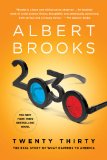Summary | Discuss | Reviews | More Information | More Books

The Real Story of What Happens to America
by Albert Brooks
June 12, 2030 started out like any other day in memory - and by then, memories were long. Since cancer had been cured fifteen years before, America's population was aging rapidly. That sounds like good news, but consider this: millions of baby boomers, with a big natural predator picked off, were sucking dry benefits and resources that were never meant to hold them into their eighties and beyond. Young people around the country simmered with resentment toward "the olds" and anger at the treadmill they could never get off of just to maintain their parents' entitlement programs.
But on that June 12th, everything changed: a massive earthquake devastated Los Angeles, and the government, always teetering on the edge of bankruptcy, was unable to respond.
The fallout from the earthquake sets in motion a sweeping novel of ideas that pits national hope for the future against assurances from the past and is peopled by a memorable cast of refugees and billionaires, presidents and revolutionaries, all struggling to find their way. In 2030, the author's all-too-believable imagining of where today's challenges could lead us tomorrow makes gripping and thought-provoking reading.
Read an Excerpt
First published in hardcover in May 2011
"With 2030 Mr. Brooks has made the nervy move of transposing his worrywart sensibility from film to book. Two things are immediately apparent about his debut novel: that it's as purposeful as it is funny, and that Mr. Brooks has immersed himself deeply in its creation." - New York Times
"The novel is a revelation, painting a caustic, unsettling and only occasionally comic portrait of a country plumb down on its luck." - Los Angeles Times
"Albert Brooks is a keen and critical social observer... His first novel is an inspired work of social science fiction, thoughtful and ambitiously conceived, both serious and seriously funny." - Boston Globe
"Comedian and filmmaker Brooks welcomes the reader to the year 2030 in his smart and surprisingly serious debut... Brooks's mordant vision encompasses the future of politics, medicine, entertainment, and daily living, resulting in a novel as entertaining as it is thought provoking, like something from the imagination of a borscht belt H.G. Wells." - Publishers Weekly
"An intriguing vision of America's future." - Library Journal
"Required reading!" - New York Post
"As a comedian and filmmaker, the very gifted Albert Brooks has specialized for more than 30 years in cooking up quandaries with no ready solution except humiliation. His often ingenious first novel is no exception." - New York Times Book Review
"Brooks's vision of the future is credible and compelling." - Booklist
This information about 2030 was first featured
in "The BookBrowse Review" - BookBrowse's membership magazine, and in our weekly "Publishing This Week" newsletter. Publication information is for the USA, and (unless stated otherwise) represents the first print edition. The reviews are necessarily limited to those that were available to us ahead of publication. If you are the publisher or author and feel that they do not properly reflect the range of media opinion now available, send us a message with the mainstream reviews that you would like to see added.
Any "Author Information" displayed below reflects the author's biography at the time this particular book was published.
Albert Brooks is a writer, actor, and director. He has written and directed several classic American comedies that are considered prescient and incisive commentaries on contemporary life, including Lost In America, Modern Romance, and Defending Your Life. Brooks has also acted in over twenty motion pictures for other directors, including Martin Scorsese's Taxi Driver, Steven Soderbergh's Out of Sight, Pixar's Finding Nemo, and James L. Brooks's Broadcast News, for which he received an Academy Award nomination. Visit him at albertbrooks.com.
Never read a book through merely because you have begun it
Click Here to find out who said this, as well as discovering other famous literary quotes!
Your guide toexceptional books
BookBrowse seeks out and recommends the best in contemporary fiction and nonfiction—books that not only engage and entertain but also deepen our understanding of ourselves and the world around us.